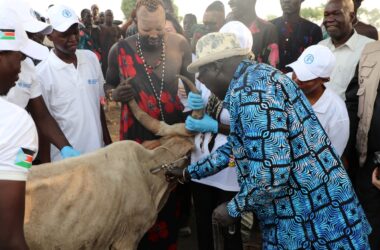By Manas James Okony
Pigi County in Jonglei State is facing a severe shortage of goods and essential services, primarily due to the detention and continued presence of multiple checkpoints along the River Nile, which connects the national capital, Juba, with the volatile Upper Nile region.
The crisis has been exacerbated by a combination of extortion by armed groups and the ongoing conflict in the area, impacting the livelihood of the local population and disrupting the flow of vital supplies.
Historically, the River Nile has served as a crucial transport route for goods and services, particularly for regions like Upper Nile, where road infrastructure is often inadequate or impassable due to seasonal flooding.
The ongoing conflict has further complicated access to these areas. The establishment of numerous armed checkpoints along the river, often manned by various factions, including the Sudan People’s Liberation Army-In Opposition (SPLA-IO), which have turned these strategic points into sites of extortion rather than legitimate customs operations.
On June 24, 2025, a particularly egregious incident occurred when several boats moving to Juba were illegally stopped and extorted by armed forces at checkpoints near the Pigi County border.
According to Seliman Deng Thon, the Pigi County commissioner, boat owners reported losing barrels of fuel and millions of South Sudan pounds during this incident.
“Checkpoints are supposed to be run by civil authorities. However, in our case, they are illegally established and run by armed groups like SPLA-IO forces,” he stated.
The situation has left the civilian population in Pigi County in dire straits, with limited access to basic services and goods.
Commissioner Deng emphasized the urgency of addressing this issue, describing the high frequency of checkpoints—less than three kilometers apart—within the vicinity of the county.
These checkpoints, including Bulang, Atar, Allela (Diel), and Dor in Fangak County, have effectively paralyzed boat operations, as owners are coerced into stopping their activities to avoid extortion.
Deng urgently appealed to national authorities, urging them to intervene promptly, warning that the plight of Pigi County is reflective of a broader crisis impacting the entire Upper Nile region.
Dau Chol Garang, the secretary-general of the Boats Trade Union in Jonglei State, corroborated the commissioner’s concerns, highlighting that the problem of multiple checkpoints has persisted over the years.
Despite efforts over the past to address these challenges, the situation has only worsened, with boat owners halting operations for two weeks due to increasing taxation and extortion.
“In Bor docking sites, over 54 boats are grounded. Several other boats are also stranded in Malakal and Unity State. No boats are coming or going,” Dau reported, emphasizing the economic ramifications of this crisis.
Dau also detailed the nature of the extortion, stating that at each checkpoint, authorities take two barrels of diesel and either a pair of each type of goods being transported—whether sugar, flour, or beans—or charge cash ranging from 4 to 5 million South Sudan pounds.
The current state of affairs in Upper Nile is marked not only by these challenges but also by ongoing violence between government troops and rival factions, making transportation along the Nile not just a logistical challenge but a dangerous endeavor.
As the region continues to grapple with the consequences of conflict and ineffective governance, the need for urgent solutions to restore safe and reliable transport of goods and services has never been more critical, lest the humanitarian crisis deepens further.




